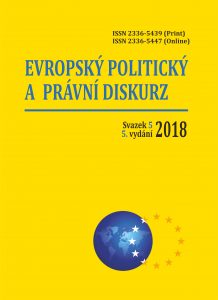DOI: 10.46340/eppd.2024.11.4.4
Alina Polukhina, PhD in Political Science
Department of Expert Analytical Activities, Georgian-Ukrainian Expert Center, Odesa, Ukraine
Viacheslav Tarasiuk
Vasyl’ Stus Donetsk National University, Vinnytsia, Ukraine
How to cite: Polukhina, A., & Tarasiuk, V. (2024). Narratives of the Russian Federation: from Military Strategy to War Crimes (Based on Statements at the OSCE Permanent Council Meetings). Evropský politický a právní diskurz, 11, 4, 35-40. https://doi.org/10.46340/eppd.2024.11.4.3
Abstract
The article examines the role of strategic narratives that the Russian Federation uses to legitimize its aggression against Ukraine, particularly through statements at the OSCE Permanent Council meetings in February-March 2022 and 2024. Strategic narratives play an important role in shaping the international image of the state and justifying its actions, especially in the conditions of information warfare. The research uses the method of qualitative content analysis, in particular the analysis of the texts of the statements of the Russian Federation at the meetings of the Permanent Council of the OSCE. Attention is focused on identifying and analyzing the main strategic narratives used to justify military actions and war crimes, as well as how these narratives change in response to the development of the international political situation. The results of the analysis showed that the Russian Federation systematically uses several key narratives to justify its aggression against Ukraine. Chief among them is the justification of military actions by the need to protect the Russian-speaking population from “genocide” and fight against “neo-Nazism”. In addition, Russia actively discredits international organizations such as the OSCE, accusing them of being biased and unable to resolve conflicts effectively. The analysis of the statements of 2024 shows an increase in the aggressiveness of the rhetoric, especially in the accusations against Western countries, which, according to Russia, allegedly contribute to the escalation of the conflict in Ukraine. These changes in rhetoric reflect the evolution of narratives aimed at adapting to new international challenges and increasing pressure on the international community. The revealed narratives confirm that the Russian Federation continues to actively use information warfare to justify its aggression against Ukraine and undermine the international consensus to condemn its actions. The evolution of these narratives reflects the adaptation of Russia’s strategy to new political realities and growing international pressure. Further monitoring and detailed analysis of these narratives is critical for developing effective strategies to counter Russian propaganda at the international level, which, in turn, will contribute to strengthening the international legal order and ensuring global security.
Keywords: narratives, Russian aggression against Ukraine, war crimes, OSCE, rhetoric, military strategy, information war.
References
Mandziuk, A. (2017). Zasady rozroblennia stratehichnoho naratyvu [Basics of Developing a Strategic Narrative]. Global Organization of Allied Leadership. https://goal-int.org/zasadi-rozroblennya-strategichnogo-narativu/ [in Ukrainian].
Oates, S. (2023). Nothing is True, But It Turns Out Not Everything is Possible: Putin’s Failed Attempt to Turn Strategic Narratives into Military Success in the Ukrainian Invasion. http://dx.doi.org/10.2139/ssrn.4412501
OSCE (2022a). PC.JOUR/1358. Reinforced Meeting of the Permanent Council (1358th Plenary Meeting), 24 February 2022 (in the Neuer Saal and via video teleconference). https://www.osce.org/files/f/documents/e/5/514444.pdf
OSCE (2022b). PC.JOUR/1359. Special Meeting of the Permanent Council (1359th Plenary Meeting), 27 February 2022 (in the Neuer Saal and via video teleconference). https://www.osce.org/files/f/documents/0/1/514468.pdf
OSCE (2024c). PC.JOUR/1360. Plenary Meeting of the Permanent Council (1360st Plenary Meeting), 3 March 2022 (in the Neuer Saal and via video teleconference). https://www.osce.org/files/f/documents/d/7/514480.pdf
OSCE (2024d). PC.JOUR/1361. Special Meeting of the Permanent Council (1361st Plenary Meeting), 7 March 2022 (in the Neuer Saal and via video teleconference). https://www.osce.org/files/f/documents/1/b/514931.pdf
OSCE (2024a). PC.DEL/186/24. Otvetnaja replika zamestitelja Postojannogo predstavitelja Rossijskoj Federacii M.A.Bujakevicha na rasshirennom zasedanii Postojannogo soveta OBSE 23 fevralja 2024 goda [Reply by Deputy Permanent Representative of the Russian Federation M.A. Buyakevich at the expanded meeting of the OSCE Permanent Council on 23 February 2024]. https://www.osce.org/files/f/documents/e/d/564173.pdf
[in Russian].
OSCE (2024b). PC.DEL/281/24/Corr.1. Vystuplenie zamestitelja Postojannogo predstavitelja Rossijskoj Federacii A.A.Volgarjova na zasedanii Postojannogo soveta OBSE [Speech by Deputy Permanent Representative
of the Russian Federation A. A. Volgarev at the meeting of the OSCE Permanent Council]. https://www.osce.org/files/f/documents/f/8/565852.pdf [in Russian].
OSCE (2024c). PC.JOUR/1462. Reinforced Meeting of the Permanent Council (1462nd Plenary Meeting), 23 February 2024 (in the Ratsaal and via video teleconference). https://www.osce.org/files/f/documents/d/9/564137.pdf



